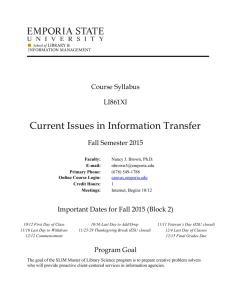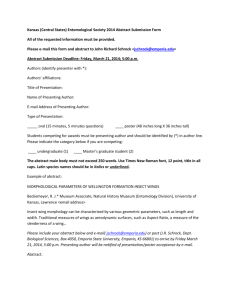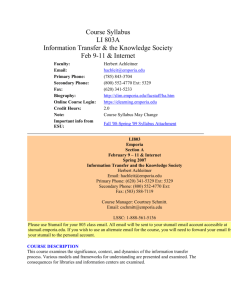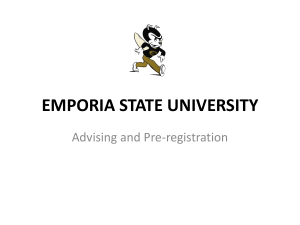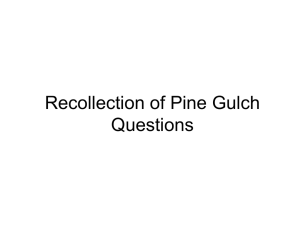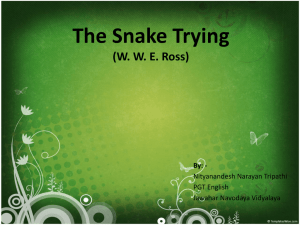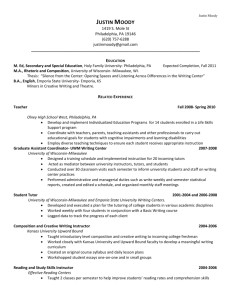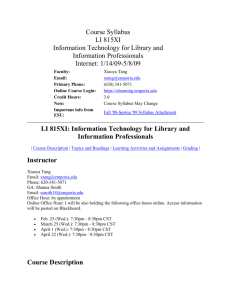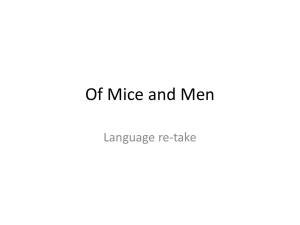801- Foundations of Library and Information Science
advertisement
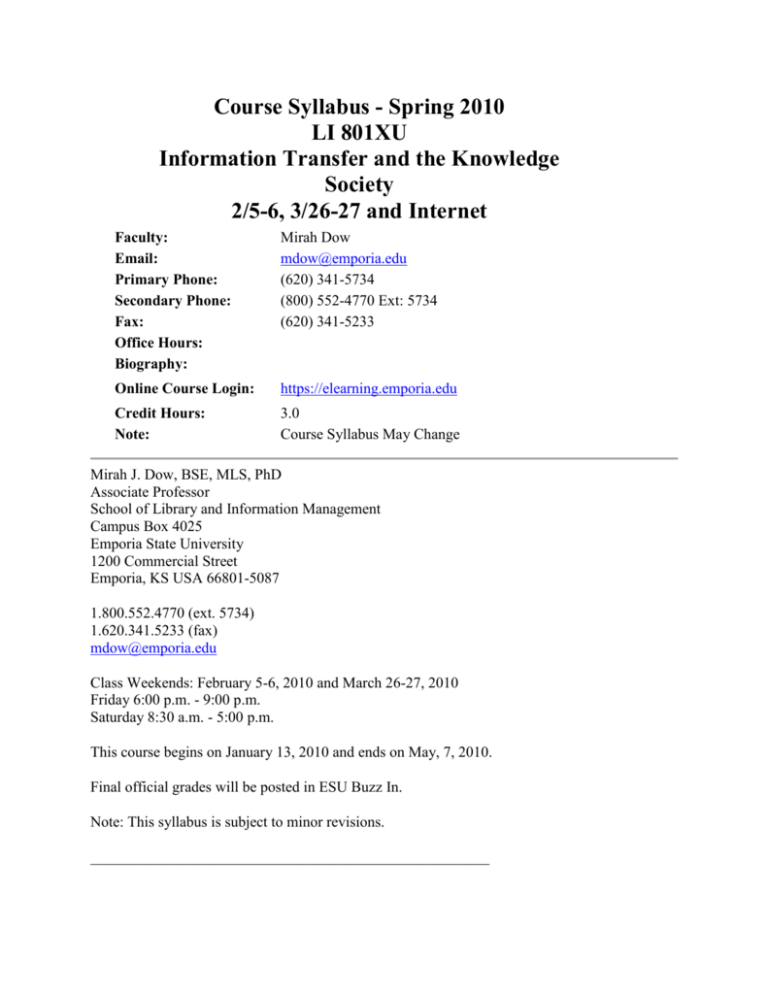
Course Syllabus - Spring 2010 LI 801XU Information Transfer and the Knowledge Society 2/5-6, 3/26-27 and Internet Faculty: Email: Primary Phone: Secondary Phone: Fax: Office Hours: Biography: Mirah Dow mdow@emporia.edu (620) 341-5734 (800) 552-4770 Ext: 5734 (620) 341-5233 Online Course Login: https://elearning.emporia.edu Credit Hours: Note: 3.0 Course Syllabus May Change Mirah J. Dow, BSE, MLS, PhD Associate Professor School of Library and Information Management Campus Box 4025 Emporia State University 1200 Commercial Street Emporia, KS USA 66801-5087 1.800.552.4770 (ext. 5734) 1.620.341.5233 (fax) mdow@emporia.edu Class Weekends: February 5-6, 2010 and March 26-27, 2010 Friday 6:00 p.m. - 9:00 p.m. Saturday 8:30 a.m. - 5:00 p.m. This course begins on January 13, 2010 and ends on May, 7, 2010. Final official grades will be posted in ESU Buzz In. Note: This syllabus is subject to minor revisions. _____________________________________________________ Please make a copy of this syllabus and bring it to orientation and to class with you. _____________________________________________________ Course Description An introduction to information agencies and professions, this course examines philosophical and ethical underpinnings, roles and societal contexts, and current topics of interest in the global information society. Students explore the role of information in society, change as reflected in paradigm shifts, the theory and processes of information transfer, and the characteristics of information professionals and professional practices. (Required - Recommended for all MLS student in their first semester.) Course Learning Outcomes (9) Upon completion of this course, the learner will at the introductory level be able to 1. describe from past to present the library's mission and its values. (Assignment #4 - inclass participation) 2. identify and reflect on some major topics and issues in library and information science that are current in the United States and will continue to affect the profession for years to come. (Assignment #2) 3. know and reflect on the information transfer model, namely creation, recording, reproduction, dissemination, bibliographic control, organization by disciplines, diffusion, utilization, preservation, and deletion. (Assignment #2) 4. describe and reflect on the role of information professionals in today's society taking into account a variety of political, economic, technological, and social forces. (Assignment #2) 5. identify and integrate personal values, beliefs, and behaviors with core tenets of the library/information management profession. (Assignments #1, #2, #3, #4) 6. demonstrate in written formats and class discussions professional behavior, knowledge, and attitudes essential to a client-centered philosophy and ethical information practices. (Assignment #3) 7. demonstrate leadership in written formats and class discussion by conveying vision and adaptability, openness to new ideas, and informed risk-taking dispositions in action. (Assignments #2 and #4) 8. work effectively and collaboratively with others, online, one-to-one, and in large and small groups. (Assignments #3 and #4) 9. begin planning with the program advisor individual participation in the Master of Library Science program. (orientation and independent follow-up) Master of Library Science (MLS) Program Outcomes & Professional Values http://slim.emporia.edu/wp-content/uploads/2008/10/slim_values.pdf Content and learning activities useful for achievement of all MLS Program Outcomes and Professional Values are included in each MLS course. While many may be covered and practiced throughout participation in LI801, three of the eight outcomes are aligned with learning outcomes in this course and will be specifically targeted: MLS Program Outcome #1. Articulate a philosophy of client-centered information services based on the epistemological and ethical foundations of the library and information professions. (Assignment #2) MLS Program Outcome #7. Demonstrate life-long learning skills by continually acquiring new knowledge, skills, and perspectives to respond to changing conditions. (Assignment #1 and #2) MLS Program Outcome #8. Communicate effectively in writing, in conversation, and in using information technologies. (Assignments #1 - #4) Note: Save your course syllabi and learning products (artifacts) for use in development of your MLS Capstone Portfolio (LI880). Course Format This course will be held face-to-face on the above-stated weekends in Salt Lake City, Utah. This course will also utilize (all enrolled students) Blackboard (Bb) throughout the semester. Expected Participation Students are expected to stay actively engaged in this class and on time with readings and assignments. Students are expected to participate in all scheduled class sessions. Students are expected to contribute individually, as well as in small groups. Except in the case of an emergency that is immediately communicated to the professor, no incompletes will be given. Students are likely to have a variety of backgrounds and experiences. Students are likely to have a variety of different kinds and quantity of prior knowledge and experiences. All students are expected to welcome and value all classmates' participation. Students are expected to be flexible, tolerant and effective participants in this hybrid course delivery system. Professor's Responsibilities My responsibility is to provide students with ongoing instruction, resources, strategies, guidance as needed to facilitate intellectual, professional, and interpersonal growth. My goal is for you to experience a positive and productive learning experience during this course, and ultimately beyond this class while earning the Master of Library Science degree. It is my practice to read e-mail almost every day except on some occasions when I am traveling or when I take a day or two off during the work week. I expect to respond to your e-mail within 48 hours. In the rare event that I am not able to write as much as is needed, I will tell you when I will be back to you. I also will send a message to the class most Mondays called Monday from Mirah. The purpose of this weekly message is to guarantee you a steady and continuous flow of instruction/information from me throughout the semester. The Monday from Mirahmessages rarely require a response. I do ask that you read all of them and respond if it is necessary and/or useful for you to do so. It is my practice to give students feedback throughout the semester. Each student will receive scores and/or comments from me using the rubrics that are in Bb. Student's Responsibilities Your responsibility is to complete all course requirements on time. It is your responsibility to diligently cover course readings and related materials and to be competent in your faceto-face participation and/or with various forms of technology-assisted instruction. It is your responsibility to ask for assistance when you feel it is needed. It is your responsibility to organize and manage resources from this class in a knowledge management system befitting a professional in the library and information management field. It is your responsibility to file and save artifacts from this class (and others) for use in your MLS Capstone Portfolio (LI880). It is your responsibility to check your email at least once time every 48 hours. It is your responsibility to communicate via e-mail in an appropriate manner consistent with the structure and outline of this course. Course Materials Required Reading - Textbooks Greer, R. C., Grover, R. J., & Fowler, S. G. (2007). Introduction to the library and information professions. Westport, CN: Libraries Unlimited. ISBN-13: 978-1-59158-486-5. Assigned reading: Read the Greer et. al. Chapters 1, 2, 3, 4 in preparation for the February 5-6 weekend ; read Chapters 5, 6, 7, 8, 9, 10 before March 26-27 weekend. Rubin, R. E. (2004). 2nd Edition. Foundations of library and information science. New York: Neal-Schuman. ISBN 1-55570-518-9 Assigned reading: Read the Rubin preface and Chapters 1, 2, 3, 7, and 8 in preparation for the February 5-6 weekend; read Chapters 4, 5, 6, 9, and 10 before the March 26-27 weekend. Severson, R. J. (1997). The principles of information ethics. Armonk, NY: M. E. Sharpe. Assigned reading: Read the Severson textbook following the February 5-6 weekend. This will be used in the ethics case assignment. *This textbooks will be available through the ESU Memorial Union Bookstore http://www.emporia.edu/memunion/bookstore.htm Required Reading - ESU Library Electronic Course Reserves Issue #1 - What kind of learner am I prepared to be? Burger, M. (2006). In defense of lecturing. Change, 38(6), 30. Retrieved from http://fp.arizona.edu/geog695c/PDFs/In%20Defense%20of%20Lecturing.pdf Hansen, E. J. and Stephens, J. A. (2000). The ethics of learner-centered education: Dynamics that impede the process. Change, 33, 41-47. Issue #2 - Librarianship in a world where information is self-correcting, selforganizing and never finished Bennington, A. (2008). Dissecting the web through Wikipedia. American Libraries, 46-48. Reich, J. (2009, Saturday, July 11). In schools, a fire wall that works too well. The Washington Post. Retrieved from http://www.washingtonpost.com/wpdyn/content/article/2009/07/10/AR2009071003459.html Schiff, S. (2006). Know it all: Can Wikipedia conquer expertise? The New Yorker, 36-43. Issue #3 - Research in Library and Information Studies (LIS): An example Huotari, M., & Chatman E. (2001). Using everyday life information seeking to explain organizational behavior. Library & Information Science Research, 23, 351-366. Issue #4 - Library and Information Professionals Ajiferuke, I. (2003). Role of information professionals in knowledge management programs: Empirical evidence from Canada. Information Science Journal, 6, 247-257. Retrieved from http://inform.nu/Articles/Vol6/v6p247-257.pdf Ridway, E. (2009). Teaching with primary sources: Professional development from the Library of Congress at your fingertips. Knowledge Quest, 38(2), 60-61. Mason, R. O. (1990). What is information professional? Journal of Education for Library Information Science, 31 (2), 122 - 138. Sheketoff, E. (2009). Stimulate your library: Local use of federal funds. American Libraries, 26-27. Issue #5 - Moving the focus from malpractice to good practice Cannan, J. (2007). Are public law librarians immune from suit? Muddying the already murky waters of law librarianship. Law Librarian Journal, 99(1), 7-32. Required Viewing - One Film from My List As part of assignment #2 (reflective journal), you are required to view one of the following videos and reflect on it (one entry in journal) in relationship to aspects of LI801 course content. Please read the complete instructions for assignment #2 in Bb course documents. My List Desk Set; In the Name of the Rose; Teacher's Pet, Stand and Deliver; Stanley and Iris; Party Girl; Shooting the Past; Mona Lisa Smile; The Mummy; The Mummy Returns Required Book Reading - One Book from My List As part of assignment #2 (reflective journal), you are required to read one of the following books and reflect (one entry in journal) on it in relationship to aspects of LI801 course content. Please read the complete instructions for assignment #2 in Bb course documents. My List Frankl, V. E. (1997). Man's search for meaning. Boston, MA: Bacon Press. (There are many editions of this book. All are acceptable.) Friedman, T. L. (2005). The world is flat: A brief history of the twenty-first century. New York, NY: Farrar, Straus and Giroux. Kuhn, T. S. (1996). The structure of scientific revolutions, 3rd. Ed. Chicago, IL: University of Chicago Press. Man, J. (2002). Gutenberg: How one man remade the world with words. New York, NY: John Wiley and Sons. McLeod, K. (2007). Freedom of expression: Resistance and repression in the age of intellectual property. Minneapolis, MN: University of Minnesota Press. Shera, J. H. (1970). Sociological foundations of librarianship. Asia Publishing House. Wilson, P. (1977). Public knowledge, private ignorance: Toward a library and information policy. Westport, CT: Greenwood Press. Assignments (4) & Due Dates Assignment #1 - Professional Interview - Due Date: March 1, 2010 Assignment #2 - Reflective Journal - Due Date: April 30, 2010 Assignment #3 - Small Group Work, Ethics - Due Date: March 27, 2010 Assignment #4 - Individual Class Participation - Recorded May 7, 2010 Assignment #1 - #4 Instructions and Rubrics for evaluation of student work are in Blackboard Course Documents. Grading Policy All work, including Blackboard postings, must be submitted as required on or before the due date and reflect professional care in presentation, appearance, and technical quality. On a conceptual level, content presented should reflect a high degree of original thinking, logic, and careful analysis. When cited, the work of others must be properly credited. In addition, each assignment will include directions specific to that activity. Grading Scale Assignment #1 - Professional Interview - 30 points Assignment #2 - Reflective Journal - 50 points Assignment #3 - Small Group Work, Ethics - 5 points Assignment #4 - Individual Class Participation - 15 points Total Points - 100 96 - 100 93 - 95 90 - 92 85 - 89 83 - 84 A 80 - 82 C+ AB+ B B- 75 - 79 72 - 74 < 72 C D F SLIM Attendance Policy Students must attend all face-to-face classes. In cases of emergency, see SLIM's Policy and Procedures for Absence from a Class Weekend due to Illness or Personal Emergency (PDF). SLIM Grade Policy All graduate courses included in the SLIM MLS and doctoral programs' required curricula or their approved substitutions must be passed with a final grade of B- or better to receive academic credit. If a student does not receive a final grade of B- or better in any or all of SLIM’s required classes, then the student will be placed on academic probation and notified by the office of the director of program administration that he or she must retake that course or those courses. When a student has been placed on academic probation, an administrative hold will be placed on the student’s record to block future enrollment. The administrative hold can only be released by the student’s academic advisor or by the SLIM dean or director of program administration. Before enrollment can be done, the student is required to meet with the student’s academic advisor with the goal of developing an academic improvement plan. If a student has a semester GPA of less than 3.0 for two semesters or is on academic probation for two semesters, then the student’s academic progress will be reviewed in light of the academic improvement plan by the student’s program director, the SLIM dean, and the SLIM director of program administration, and a decision will be made regarding whether the student should be academically dismissed from the SLIM’s graduate program. This policy goes into effect fall 2009 semester. This SLIM Grade Policy applies to all SLIM students, including those students who entered SLIM under the 42-credit-hour MLS program, the 36-credit-hour MLS program, or the SLIM doctoral program. It will also apply to all those who have passed into MLS or doctoral degree candidacy. SLIM Incomplete Grade Policy SLIM’s Incomplete Grade Policy upholds the Emporia State University Incomplete Grade Policy (for full policy, go to: http://www.emporia.edu/grad/docs/policyhandbook2.pdf). SLIM’s Incomplete Grade Policy further stipulates that an incomplete request will not be considered approved without an Incomplete Request Form having been submitted by the instructor and approved by the SLIM dean within two weeks after the issuance of the incomplete. If the incomplete grade is being requested for reasons of health, then documentation must be submitted to the SLIM dean’s office before the final grade change is made. If a SLIM student’s request for a single incomplete grade is approved by the instructor and dean, then the student will be limited to enrolling in six credit hours in the immediately succeeding semester. If a SLIM student requests more than one incomplete grade to be issued at the conclusion of a semester, then an administrative hold will be placed on the student’s record to block future enrollment until all incomplete grades are finished and the final grade changes have been submitted by the instructor(s), signed by the SLIM dean, and accepted by the ESU Registrar’s Office. Faculty-Initiated Student Withdrawal Procedure Students should be aware that your instructor follows the university’s policy of facultyinitiated student withdrawal. It reads as follows: “If a student’s absences from class or disruptive behavior become detrimental to the student’s progress or that of other students in the class, the faculty member shall attempt to contact the student in writing about withdrawing from the class and shall seek the aid of the office of Vice President of Student Affairs to help insure contacting the Student. The Office of the Vice President of Student Affairs shall provide the student information about the existing appeals procedures. Upon receiving a written report from the faculty member, the Vice President of Student Affairs may initiate a student withdrawal from the class. None of the above implies or states that faculty members are required to initiate the student withdrawals for excessive absence. [Policy and Procedures Manual 43.11] Academic Dishonesty At Emporia State University, academic dishonesty is a basis for disciplinary action. Academic dishonesty includes but is not limited to activities such as cheating and plagiarism (presenting as one's own the intellectual or creative accomplishments of another without giving credit to the source or sources.) The faculty member in whose course or under whose tutelage an act of academic dishonesty occurs has the option of failing the student for the academic hours in question and may refer the case to other academic personnel for further action. Emporia State University may impose penalties for academic dishonesty up to and including expulsion from the university. Disabilities Policy Emporia State University will make reasonable accommodations for persons with documented disabilities. Students need to contact the Director of Disability Services and the professor as early in the semester as possible to ensure that classroom and academic accommodations are implemented in a timely fashion. All communication between students, the Office of Disability Services, and the professor will be strictly confidential. Contact information for the Office of Disability Services: Office of Disability Services 211 S Morse Hall Emporia State University 1200 Commercial Street / Box 23 Emporia, KS 66801 Phone : 620/341-6637 TTY: 620/341-6646 Email: disabser@emporia.edu Copyright © 2011-2012 School of Library & Information Management Emporia State University 1200 Commercial Campus Box 4025 Emporia, KS 66801 voice: (800) 552-4770 voice: (620) 341-5203 - other numbers fax: (620) 341-5233 Content comments for the instructor: mdow@emporia.edu Technical questions: slimhelp@emporia.edu
